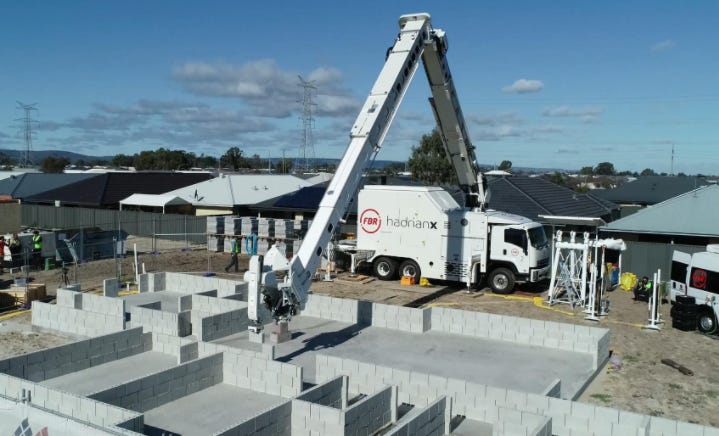"Where are the robotic bricklayers?" "Masonry construction seems almost perfectly suited for mechanization. It's extremely repetitive... it doesn't seem like it would require physically complex movements... and placement is almost deterministic... On top of this, masonry, especially block masonry, is one of the most physically punishing construction tasks... It's something people have been attempting for over 100 years."
Early attempts: John Thompson patents in 1904, 1918, and 1926, Motor Mason from 1967.
1980s and 90s bricklaying robots: Academic robots by Slocum, Lehiten, Rihani, Altobelli, and Pritschow, the SMAS in Japan, the ROCCO system.
Current attempts: The Hadrian system by Fastbrick Robotics, which uses a hollow boom mounted to a truck, through which masonry blocks are transported (sort of like a concrete pump truck), and SAM, the semi autonomous mason, built by Construction Robotics, and in use on commercial projects since 2015, but on short walls it has trouble outperforming human masons, can't turn corners, and can't finish the masonry joints.
"Masonry seemed like the perfect candidate for mechanization, but a hundred years of limited success suggests there's some aspect to it that prevents a machine from easily doing it. This makes it an interesting case study, as it helps define exactly where mechanization becomes difficult -- what makes laying a brick so different than, say, hammering a nail, such that the latter is almost completely mechanized and the former is almost completely manual?"
"There seems to be a few factors at work. One is the fact that a brick or block isn't simply set down on a solid surface, but is set on top of a thin layer of mortar, which is a mixture of water, sand, and cementitious material. Mortar has sort of complex physical properties -- it's a non-newtonian fluid, and it's viscosity increases when it's moved or shaken."
Where are the robotic bricklayers?
#solidstatelife #robotics #constructionrobotics #bricklaying #masonry
